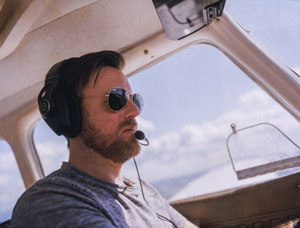Pilot & Executive
 In the United States, it’s often said that aviation is good for business — and much of that belief is based on the idea that companies using private aircraft for travel consistently outperform their competitors. But what about CEOs who fly simply because they love to fly?
In the United States, it’s often said that aviation is good for business — and much of that belief is based on the idea that companies using private aircraft for travel consistently outperform their competitors. But what about CEOs who fly simply because they love to fly?
There is now tangible evidence showing that these leaders actually perform better — both in the boardroom and on the company’s bottom line — not in spite of their affinity for aviation, but because of it.
A detailed body of research demonstrates that CEOs who are pilots outperform their non-flying counterparts across key performance metrics, including risk management and willingness to foster innovation. The examples span decades — from the legendary Howard Hughes to Oracle’s Larry Ellison — but today, there’s solid data to back up the observation. Two separate academic studies published in recent years confirm that pilot CEOs consistently outperform “non-pilot” CEOs.
Flying and Financial Performance
A 2016 study published in the Journal of Financial and Quantitative Analysis by researchers Matthew Cain and Stephen McKeon compared 179 pilot CEOs with a cohort of 2,900 non-pilot CEOs between 1992 and 2009.
They found that pilot CEOs achieved higher levels of company performance, largely thanks to a greater appetite for calculated risk.
When examining the overall effect of pilot CEOs on corporate risk-taking, Cain and McKeon observed that personal risk-taking behavior extends beyond financial incentives linked to compensation.
Their findings were striking:
“Pilot CEOs are significantly more likely to engage in acquisitions. More importantly, a substantial portion of performance improvement is explained by acquisition activity in companies led by these pilot CEOs.”
Because acquisitions inherently involve elevated risk, the researchers noted that pilot CEOs tend to make wiser choices, often targeting smaller firms relative to their own. They also found that pilot CEOs’ compensation is more strongly performance-based, reflecting their risk-reward mindset.
Pilots and Innovation
A 2017 study published in the Journal of Financial Economics by Jayanthi Sunder, Shyam Sunder, and Jingjing Zhang concluded that:
“The aviation hobby of pilot CEOs is associated with significantly better innovation outcomes — measured by the number, diversity, and originality of patents and scientific publications.”
The research points to thrill-seeking as a defining personality trait. Far from being reckless, this characteristic correlates with creativity and the willingness to innovate. The authors suggest that companies led by pilot CEOs are more likely to pursue diverse and pioneering initiatives, resulting in stronger innovation performance.
Original, high-impact patents from these firms often triggered positive market reactions, especially around patent approval dates.
Notably, the studies highlight that the “pilot personality” goes beyond mere risk-taking — it reflects intrinsic motivation and disciplined decision-making, making pilot CEOs potentially more effective leaders than their non-pilot peers.
Companies led by pilot CEOs also tend to exhibit greater capital dynamism and sustained long-term growth.
The Profile of a Pilot CEO
Sunder and his co-authors found that pilot CEOs tend to rise through corporate ranks faster and are less likely to have attended elite universities. They are typically younger, more often hold engineering degrees, and many have military experience.
Their 1993–2003 study also identified where these executives are most active:
- 22% in energy,
- 10% in capital goods,
- 8% in manufacturing,
- 6% in consumer non-durables,
- 6% in telecommunications, and
- 5% in healthcare.
Most of the CEOs studied by Cain and McKeon flew for personal enjoyment rather than business travel. Sunder’s team found that half did not hold an IFR (Instrument Flight Rules) rating, and 82% were based in major U.S. metropolitan areas.
In the End, It’s Good for Business!!
Regardless of why these leaders take to the skies — for passion or practicality — the results speak for themselves:
CEOs who fly deliver stronger company performance, greater innovation, and superior returns.
Flying, it seems, doesn’t just lift airplanes — it lifts businesses too.
Laurent van Hamme